How to Freeze Vegetable Seeds for Storage
How To Freeze Vegetable Seeds For Storage
Vegetable Seeds for planting
A lot of beautiful flowers and healthy vegetables can be grown easily from seeds. Therefore, some gardeners and farmers may need these tips on how to freeze vegetable seeds for storage and keep them alive until the right cultivation season.
Let’s answer some common questions about seed storage and learn how to freeze plant seeds for cultivation properly.
- Where can I store seeds at home?
- How long to freeze seeds before planting?
- Does freezing seeds affect germination?
How To Freeze Vegetable Seeds For Storage
Freezing seed is a method to store it for a short or long time and wait until the best time for cultivation or when you bought more seeds than the real demand. Follow these steps and recommended conditions to freeze vegetable seeds correctly for long-term storage.
Prepare seeds for storage
The preparation step is very important for storage. Collecting, cleaning, and drying must be done carefully to prevent mold and termites from developing and destroying seeds.
- First of all, the seeds collected must be mature enough and not damaged. Young and damaged seeds cannot germinate no matter how well you take care of them. Thus, farmers and gardeners must keep track of the seed’s age and collect older ones first.
- Next, mature and intact seeds must be rinsed and cleaned carefully to remove the layer of gel outside the seed or pest if any. For example, tomato seeds are often covered by a gel layer.
- Then, spread seeds on a clean screen, and place them in an airy location or in the dehydrator at 35-40 Celcius degrees. You can also use a fan to create airflow and dry seeds faster.
Only 1% of moisture can reduce half of the storage life for seeds as mold can reduce their germination rate. If seeds are not dried properly, they cannot germinate. For example, if you dry seed under strong sunlight or at a too high temperature, the plant germs can be killed.
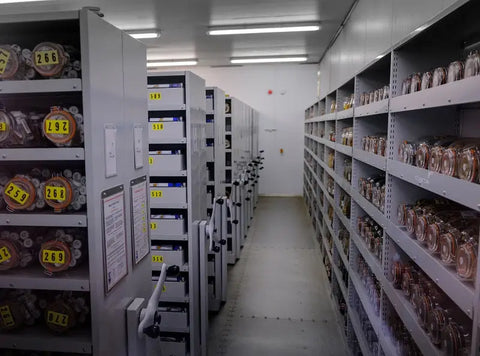
Storage conditions for freezing seeds
You can freeze seeds in either the fridge or the freezer at a low temperature. It’s essential to keep the temperature stable because the storage life can be affected when the temperate fluctuates.
Let seeds cool at room temperature before storing. Don’t put hot seeds in the fridge directly or the sudden temperature change can create Check out the condition of how to freeze vegetable seeds for storage for different purposes here.
|
Purposes |
Temperature |
Humidity |
Other conditions |
|
Short-term storage (for the next cultivation season) |
26°C – 28°C |
30% |
Rodent-proof, dry, dark, and airtight container |
|
Mid-term storage |
0°C |
30%-40% |
Rodent-proof, dry, dark, and airtight container |
|
Long-term storage |
-10°C |
30%-40% |
Seeds are completely dried and stored in a rodent-proof, dry, dark, and airtight container. |
If you want to increase the storage life of vegetable seeds, make sure they are completely dried. When you reduce every 12°C of the storage room, you can double the storage life for plant seeds.
Under standard storage conditions, vegetable seeds have different longevity. For example,
|
Longevity |
Vegetable seeds |
|
5 years |
Broccoli, Artichokes, Celery, Cucumber, Cabbage, etc. |
|
4 years |
Cauliflower, Eggplant, Fennel, Mustard, Pumpkins, etc. |
|
3 years |
Beans, Carrots, Peas, Spinach, etc. |
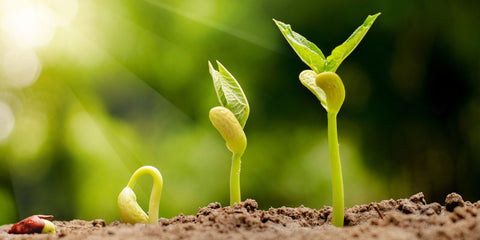
How To Use Frozen Seeds
Apart from learning how to freeze vegetable seeds for storage, you also need to know how to use frozen plant seeds to grow. It’s required to process correctly to make vegetable seeds stored by freezing method to grow.
- Take the frozen seeds out of the fridge or freezer
- Let them thaw at room temperature for 24 hours or more their temperature goes up gradually and naturally.
- Plant the seeds.
Don’t use the oven or any heating devices to thaw the seeds. If you want to test the germination of the seed before planting them, take some random seeds and follow some simple steps below.
- Have one wet paper towel.
- Place sample seeds in the wet paper towel and fold the towel gently.
- Put the towel in a plastic zipper baggie and label it with the name of the seed and the date of testing.
- Place the baggie near a heat source, such as the top of the fridge or near a heat vent. But don’t place it under strong direct sunlight.
Check the test sample every couple of days for a few days. If a high rate of germination is observed, the frozen seeds are good enough to be planted. Some seeds only take you two weeks to germinate, such as the beefsteak plant seeds.
Testing the seed viability before growing them lets you know if the seeds are still alive or not. Then, you don’t need to wait for dead seeds to grow in vain. Growing vegetables by seeds, such as lettuce and spearmint, are very easy, as long as you follow the right method.
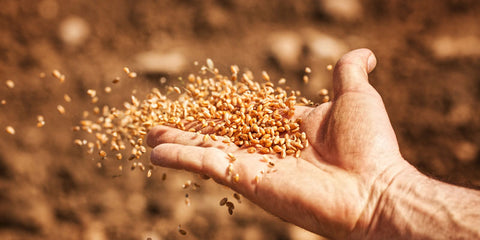
Q&A: Freezing Seeds For Storage
There are some common questions about how to freeze vegetable seeds for storage, which could be your curiosity. Let’s find out the answer here.
Where can I store seeds at home?
Yes. You can keep seeds in the basement, closet, or any empty room in your house which is clean, rodent-proof, cold, dry, and dark. Besides, dried seeds must be kept in an airtight container for storage. Additionally, you must maintain the temperature at a stable level so that seeds are not affected by sudden temperature changes.
How long to freeze seeds before planting?
Based on your purpose and the longevity of the vegetable seeds, they can be stored in freezing conditions for up to five or six years.
Does freezing seeds affect germination?
No. If you freeze and thaw them correctly, most vegetable seeds can grow well. Make sure that all seeds are dried well before the cold storage to prevent mold and other damages.
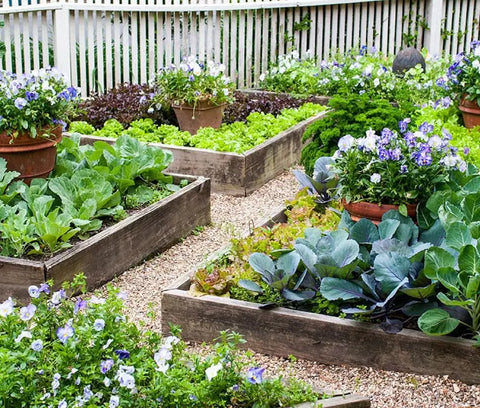
Conclusion
Have you understood how to freeze vegetable seeds for storage? As long as you strictly follow the standard storage process and conditions, the vegetable seeds will grow strongly and beautifully. Preparing seeds properly, paying attention to the temperature and humidity during the storage duration, and testing the germination before growing them are important steps that farmers would keep in their mind. Besides,
provides you with a lot of high-quality flower and vegetable seeds.


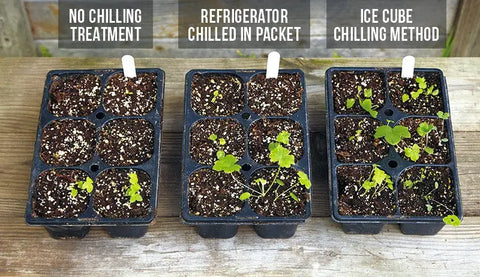



Leave a comment